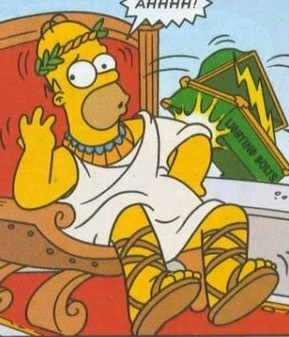1. The Irrational
How is Greek drama (specifically, Euripides) a way of dealing with
the irrationality of life?
Greek drama is famous, really, for two different categories of theater. Most students will at least be familiar with comedy and tragedy, even though, I wouldn’t judge if they didn’t know much else. These types of drama helped citizens of ancient Greece deal with the irrationality of life by simplifying the complex and difficult lessons that one will learn during the duration of their own life. What I have noticed, especially in the case of Euripides, is that Greek drama often oversimplifies these complex topics resulting in some resolutions that are difficult to swallow or even just plain laughable.
 The main purpose of the Greek tragedy was to show the Greeks how they should act, or, probably more accurately, not act. The drama would start with a hero who exemplified some mighty character trait. Over time the hero would develop or begin to show his tragic flaw, most likely hubris, and begin on the path of anagnorisis. As the retold stories become more realistic, they also become more complex. Eventually, some tragic dramas got so complex that the only solution was divine intervention in the form of deus ex machina. Unfortunately, in an attempt to explain the mysteries of life, this divine intervention leaves most people wondering, “Why doesn’t Zeus appear to me and solve my problems?” Euripides has even been criticized for making a joke of deus ex machina.
The main purpose of the Greek tragedy was to show the Greeks how they should act, or, probably more accurately, not act. The drama would start with a hero who exemplified some mighty character trait. Over time the hero would develop or begin to show his tragic flaw, most likely hubris, and begin on the path of anagnorisis. As the retold stories become more realistic, they also become more complex. Eventually, some tragic dramas got so complex that the only solution was divine intervention in the form of deus ex machina. Unfortunately, in an attempt to explain the mysteries of life, this divine intervention leaves most people wondering, “Why doesn’t Zeus appear to me and solve my problems?” Euripides has even been criticized for making a joke of deus ex machina.Perhaps unbeknownst to the world, where Euripides really excels is in his comedic theater. The whole purpose of Greek comedy is to criticize and make fun of real people, events, or ideas. Even when Euripides’ work is consider tragic, you have to wonder if the flaw he was trying to show was really a type of hubris or if he meant to show the flaws of tragedy itself. I, for one, have never been able to solve any of my personal problems with deus ex machina. I think Euripides considered the machine to be reducto ad absurdum (a reduction to absurdity). A solution like that couldn’t possibly work for me because it’s just so oversimplified!
The Greeks used simplification to help themselves understand the irrationality of life, which worked to a large extent. But when it didn’t, Euripides used oversimplification to show the irrationality of simplification.
2. Homer and Rhetoric
Homer was not a rhetorician, and the Iliad or The Odyssey are not rhetorical treatises. Why, then, is Home so significant to the history of rhetoric?
 The epic poetry written by Homer has been included as a significant part of the study of classic rhetoric for decades or further. Although Homer’s work does not fall under the same categories as most of the rhetorical material of his contemporaries, his works serve the same purpose as any of the rhetorical treatises: to persuade. His writings take the form of leisurely entertainment, but perhaps this choice of delivery actually make Homer the most effective of Greek rhetorical minds.
The epic poetry written by Homer has been included as a significant part of the study of classic rhetoric for decades or further. Although Homer’s work does not fall under the same categories as most of the rhetorical material of his contemporaries, his works serve the same purpose as any of the rhetorical treatises: to persuade. His writings take the form of leisurely entertainment, but perhaps this choice of delivery actually make Homer the most effective of Greek rhetorical minds.Homer was able to have his voice heard by many not only in modern study of rhetoric, but by the people of his time who had no interest in rhetoric. His stories related to those who heard them because they featured common themes, events, and characters, but his strong underlying motifs provided introspection for the individual (much like the rhetoricians of ancient Greece) AND a certain amount of social moral consideration.
In a time when the strengths of war were considered virtuous - when strength, anger, and the ability to kill were among the highest honors a man could have -, Homer used tragedy to question where true virtue and honor should lie. The characters of the Iliad are constantly choosing kleos over their friends and family, and with each decision they make, the tension of impending doom pulls at the heart strings of those who hear the story. In the Odyssey, Homer shows how wit and cleverness can be more powerful than the martial arts at their own game, subliminally showing listeners that the common perception of arête is critically flawed. These two examples, extracted from a long list of possibles, serve to show how Homer utilizes different rhetorical techniques to persuade (pathos and logos).
In short, Homer may not be a rhetorician by trade or title, but by their works ye shall know them. His is the art of persuasion as it is of Plato, Socrates, and Aristotle. Homer’s works may not be rhetorical by definition, but their very nature is rhetorical in form, in content, and in value.
No comments:
Post a Comment